 May 28 marks the beginning of National Tire Safety Week, designated to highlight the importance of tire maintenance and safety for all drivers. This time of year is also when families make plans for summer road trips, so now is the time to make sure your tires are in good condition.
May 28 marks the beginning of National Tire Safety Week, designated to highlight the importance of tire maintenance and safety for all drivers. This time of year is also when families make plans for summer road trips, so now is the time to make sure your tires are in good condition.
How car tires can contribute to an accident.
Tire pressure: According to a study by the National Highway Traffic Safety Administration (NHTSA), driving on underinflated tires can triple the likelihood of a crash compared to vehicles with proper inflation. When tire pressure isn’t maintained at recommended levels, tires can wear unevenly, possibly causing them to fail. While newer car models have pressure monitoring systems that alert drivers of low pressure via a dashboard warning light, experts still advise every driver to manually check tire pressure with a pressure gauge every month.
Tire tread: The NHTSA study showed that worn tire treads also increase the chances of an accident. According to Consumer Reports, when one or more tire grooves reaches 2/32 of an inch deep, the tire can be considered bald. Tire tread this shallow can be dangerous in rainy or snowy conditions when traction is critical. Shallow tread causes hydroplaning and can make your vehicle take longer to come to a stop on wet roads. If your tire tread is less than 4/32 of an inch deep, it’s time to shop for new ones.
While you’re inspecting the tread, also check for cracks, bulges, or cuts in your tires’ sidewalls, as well as uneven wear. All of these flaws may cause tires to fail.
Tips for tire maintenance and safety.
- Check your tire pressure every month.
- Have your tires rotated regularly to help them wear more evenly.
- Tire alignment should be checked periodically.
- Inspect your tread every month to look for wear and damage.
Have you been injured in an auto accident? Call Harrell & Harrell, P.A.
Our car accident lawyers are ready to help if you’ve been injured in an auto, truck, motorcycle or other vehicular accident. Contact us for a consultation at no cost or obligation to you: Call 904-251-1111 or toll free at 1-800-251-1111 to speak with one of our expert attorneys.
